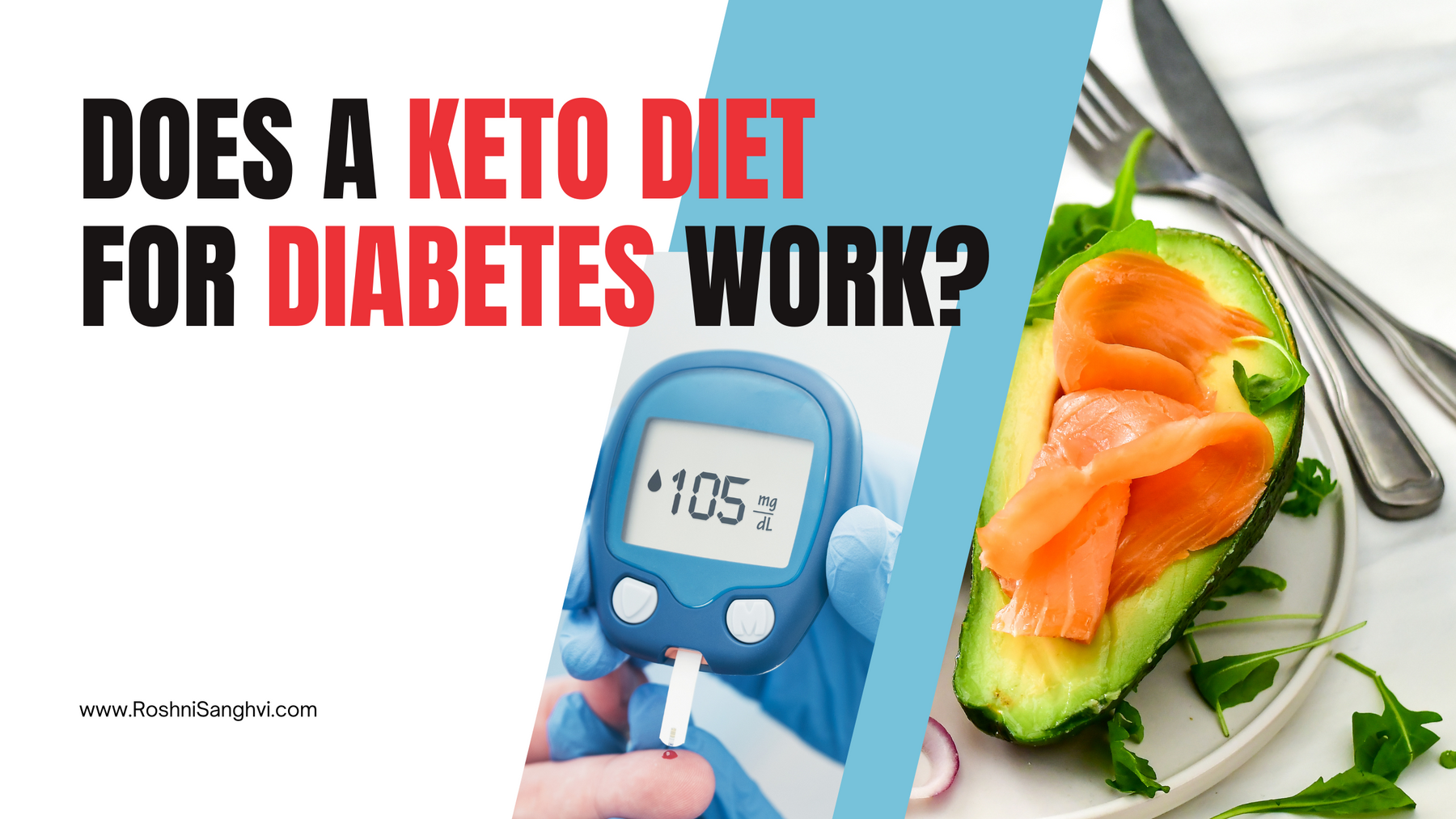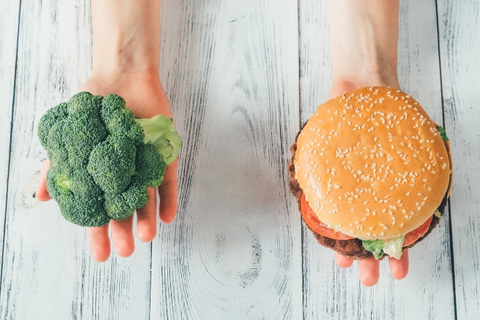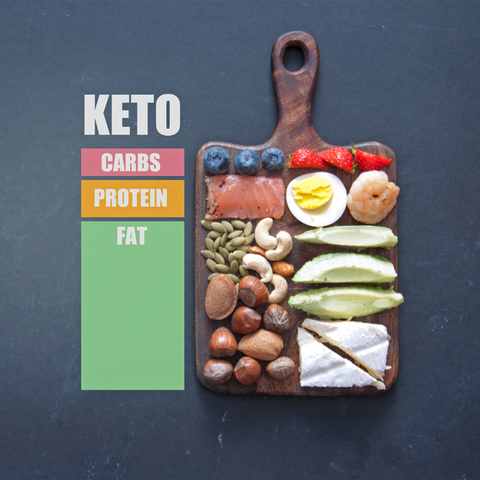
7 Reasons Why Keto Diet Doesn't Work for Diabetes
Table Of Content
The first thing you here about diabetes management is to go on a low- carb diet.
- Stop Fruits
- Stop Sugar
- Stop Rice etc.
In a recent conversation with a friend, we were discussing how best to manage her diabetes. She said that she wanted to reduce carbs as she was eating too much of it. In our friendly, coffee shop analysis of the type of food she was eating, she realised that 40% of her intake is fats, not carbs! Needless to say her diabetes symptoms were getting worse.

This ‘dieting’ mindset is a misaligned approach to managing diabetes. Diabetes is a chronic lifestyle disease and requires one to work on holistic lifestyle changes if we want to reverse the same from the roots. Various factors such as circadian health, gut health, stress, activity level and nutritional intervention play a role in diabetes management.
This article will specifically focus on your food choices, particularly, a keto diet for diabetes management.
Keto diets, are high- fat diets. Now most people do not understand carbs, fats and proteins when they look at food, so let us further define what 'fat's" are.
Think of:
- oil's,
- cheese,
- red meat,
- eggs (highest source of saturated fats among the US population),
- coconuts,
- other nuts,
- seeds, and,
- even some dairy by- products like curds and cream.
These broadly are defined as being high in fat.
Carbs on the other hand are:
- fruits,
- vegetables,
- whole grains (like wheat and rice),
- pulses (like chickpeas and kidney beans), and,
- lentils (like the different types of daal's).
So a Keto diet for diabetes management, which is low- carb and high fat, might include having panner bhurji for breakfast, eggs and bacon for lunch and cheese and lettuce leaves wrap for dinner.

A moderate carb approach for diabetes management instead will include vegetable paratha for breakfast, brown rice and sambhar with a salad for lunch and a bowl of soup with phulka and sabzi for dinner.

Treating diabetes with a keto diet may cure surface-level symptom improvement. But, in reality, they only serve to magnify the deeper impacts of diabetes. It's kind of painting your brown grass green because it has dried out. In reality, you must work on the soil quality, ensure you are watering your lawn and much more.
In this article, let's do a diabetes 101. Let’s get clear on what diabetes is, its types, and how it manifests. Then, we will look at what we need to do to reverse/manage diabetes. Further, we will explore diabetes management vs diabetes cure. We will understand what insulin resistance is and how it causes diabetes.
Next, we will look at how a keto diet makes diabetes worse! Finally, we will understand what you should be really eating to help manage diabetes.
Personally, my approach to helping my clients lies in personalization. Working with you to understand the root cause of your condition. Then, I create a customized solution to enable your health transformation.
Let's tackle the top 7 reasons why a keto diet won’t help manage your diabetes.
The Real Face Of Diabetes In India.
Our country has the infamous title of being the diabetes capital of the world!
The numbers from Statista are scary and mindblowing.
India has the 2nd largest number of diabetics worldwide. Close to 75 million adult Indians were confirmed to be diabetics in 2021. This number will shoot past 125 million by 2045.
Unfortunately, not much work is being done to help people understand the root- cause of diabetes. Generalized advice like avoiding rice (staple food for a huge population in India) and avoiding sugar is given. Most people do not really know how to put this into practice once they are back home. For instance, most people would replace sugar with sugar- free sweeteners.
The intention of this article is to help you understand the root- cause of diabetes and also explain how a Keto diet will impact long- term health.
What is Diabetes? How Does it Happen?
If you do understand Hindi, watch this video for better clarity:
Every time we eat or drink something, our body converts food into glucose. This is used as a vital source of energy.
The excess glucose is converted into glycogen.
Insulin is the crucial hormone that allows for the entry of blood sugar into our cells. This enables conversion from glucose to glycogen.
So, diabetes is our body’s inability to either produce insulin or use insulin.
That’s as simple a definition as it gets.
- Type 1 Diabetes
This is an auto-immune condition.
The cells in the pancreas that make insulin are destroyed in this case.
As a result, there's excess glucose in the blood. This type of diabetes is manageable and not curable. It affects about 10% of the total diabetes cases. As of now, the only treatment is a lifelong need to take insulin.
- Type 2 Diabetes
Also known as adult-onset diabetes. This is where the body is making Insulin, but is unable to use it. Most likely, due to a layer of fat around the cell walls that prevents glucose from entering the cells. 90% of diabetes cases in India are type 2 diabetics.
This type of Diabetes is very much treatable. Simply getting rid of the layer of fat around the cell wall helps in glucose absorption and diabetes management.
Sadly, Type 2 diabetes also affects children and teens from a result of bad eating habits and unhealthy lifestyle.
What causes Type 2 Diabetes?
Intra- myocellular fat, or fat molecules blocking cell walls is the main reason behind type 2 diabetes. It is because of this fat- layer that insulin can't do its job. But simple nutritional intervention and lifestyle changes is enough to start seeing your body heal. Here one of our clients talk about her journey on Diabetes Reversal:
Can Diabetes be Reversed?
Yes, diabetes can be reversed. Particularly type 2 diabetes, gestational diabetes and pre- diabetes. Many people think that reversing type 2 diabetes is about eating less sugar and carbs. But, it really is about cleaning up intra- myocellular fat cells.
The main problem with diabetes is the build-up of fat inside the cells of our body. When this happens, our body is unable to use insulin to convert glucose to glycogen.
Hence, to reverse diabetes, the first step to take is to eat more fibre and less fat. Meat, dairy, and eggs are the one of the highest sources of fats. Plus, they contain almost no dietary fibre.

Simply eating more whole- grains, lentils, pulses, vegetables and fruits is beneficial. On the contrary, cutting down on dairy, meat and eggs is additionally beneficial.
The next step to reverse diabetes is a crucial one. It has to do with the use of cooking oils. Again, this has to do with the amount of ‘empty fats’ we end up consuming when we use cooking oils. Even the finest extra virgin olive oils have no fibre and high levels of fat. So, keep the oil usage to a least. I suggest my clients do not use more than 1 tbsp of oil's per day.
Diabetes Management VS Diabetes Cure.
There is a prevailing misconception about managing diabetes. If we stop/reduce consuming carbs/sugar, all will be well.
Only partially true!
If your body doesn't consume the required amount of carbs and sugars, it will resort to another action. That is to break down proteins through the process of gluconeogenesis into glucose.
The body will also target fats to be used as energy.
So, limiting what you eat will at best have a short-term effect. But this works in opposition to health because it will reduce metabolism.
So, get this straight. Limiting the amount of carbs you consume will NOT help cure diabetes.
What is the solution then?
Consider this analogy.
You have a beautiful backyard garden in your home. You take great pride and satisfaction in maintaining it and keeping it healthy. If one day, you notice that a section of the plants in your garden is looking unwell, turning to decay.
Would you apply a coat of green paint to make those plants appear ‘healthy’?

Or would you look deeper into the reason why those plants are unwell? Look into the amount of water they receive. Check if the soil is healthy. Do you introduce natural soil fertilizers? Or simply make sure the plants are getting enough sunshine?
Going on diet plans to manage your diabetes is like painting the grass green. It doesn’t help to fix the real issue. If anything, it can have negative effects in the long run. How long would those plants stay healthy being painted green? In a sense, is it not doing more harm than good?
To cure diabetes, here is what you need to understand:
Why your body is not storing the excess glucose as glycogen? Why is the body not reacting to insulin? Addressing these questions is crucial. As is reviewing and improving your nutrition and lifestyle habits.
What do I mean my lifestyle changes? Watch this:
What is Insulin Resistance and How It Causes Diabetes?
When our blood cells start to become resistant to the use of insulin to absorb blood sugar, we term this Insulin Resistance. This means, more and more dependency to use more units of Insulin.
So, what causes insulin resistance?
Fat, inside of our muscle cells causes the insulin receptors to be affected. So, no matter how much insulin we have in our blood, cells aren’t using it to absorb blood sugar. Thus, blood sugar levels keep rising. This is the crux of what insulin resistance is all about.
Scientific studies dating back nearly 100 years proved this.
Young, healthy males were split up into two groups.
- One was given a fat-rich diet consisting of oils, butter, and egg products.
- The other half was given a carb-rich diet of bread, potatoes, bananas, rice & oats.
The results?
Within two days, the glucose intolerance skyrocketed in the fat-rich diet group. Using modern, medical tech, we can now understand the reason for this. It was the formation of insulin resistance.
If you continue eating a high- fat diet, over time, glucose levels will go sky- rocketing high. A high- fiber diet on the contrary will help you improve insulin sensitivity and improve blood- glucose fluctuations.
How Does a Ketogenic Diet Make Diabetes Worse?
Now that we have understood the core of diabetes and how it works, let’s change track. The topic, we began this discussion with- a high-fat ketogenic diets.
Excess fat consumption is one of the primary causes of insulin resistance.

A Keto diet makes Diabetes worse due to a few other factors:
-
Inflammation: Imagine your body on fire at all times. This is what inflammation feels like. Chronic inflammation is linked to the development of insulin resistance, further contributing to the risk of developing type 2 diabetes.
-
Alteration in Fat Metabolism: A diet high in fats, particularly unhealthy fats coming in from eggs, meat and dairy, can change the way the body processes and stores fats. This can lead to increased fatty acid levels in the blood, which may impair insulin’s ability to function properly.
-
Obesity: Fats account for 9 calories per gram. This is higher than both carbs and proteins. High-fat diets often lead to weight gain and obesity, a major risk factor for diabetes. Excess fat, especially around the abdomen, can cause cells to become more resistant to insulin.
-
Impaired Glucose Tolerance: A diet high in fats can lead to impaired glucose tolerance. This is a prediabetic state where blood sugar levels are higher than normal but not yet high enough to be classified as diabetes. This condition can progress to type 2 diabetes if dietary habits are not changed.
A Keto Diet Leads to Liver Toxicity
On a keto diet, your body is deprived of carbs it depends on generating energy. Instead, the body turns to using fat sources in the body for energy. Fat is converted to ketones in a process known as ketosis.

The liver plays an important role in using fats during ketosis. There is a risk of increased fat collection and hepatic steatosis (fatty liver disease). To add to this, consuming high-fat foods, as is done in keto, makes liver inflammation worse.
A Keto Diet Leads to Nutritional Deficiencies.
Ketogenic diets lack more than 26 essential micronutrients. Meaning, you do not consume enough of the nutrients that keep you alive and hearty!
This is one reason your body craves a lot of fiber- rich food on a Keto diet. The body is simply prompting you to eat the right kind of foods. Most promoters of a Keto diet also promote the use of a lot of supplements. People also suggest going on a Keto diet short- term only as the body is not getting essential micronutrients and can put you at the risk of diseases.

The keto diet is so restrictive in its concept. Especially depriving us of nutrient-dense fruits, veggies, whole grains, and legumes. As a result, your body is deprived of essential vitamins and minerals too.
Some of the major nutritional deficiencies that may arise are:
- Calcium: Crucial for the long-term health of our bones, teeth, and blood function.
- Magnesium: Required for energy production and normal brain function.
- Iron: Your body needs this element to make red blood cells. Also for energy production.
- Sodium: A type of electrolyte mineral that regulates the volume of blood, pressure as well as the pH balance in the body
- Potassium: Another mineral that regulates blood pressure.
These are just the top 5 nutritional deficiencies you should prepare for on a Keto Diet. There are more essential vitamins and minerals that this diet completely excludes.
Keto Diets Leads to Increase in Chronic Diseases.
Fat's must be used sparingly in our diet. Imagine you eating spoonful's of oil's but leaving out vegetables and fruits because they are high in carbs (fiber really).
One of the foremost health concerns with a high fat diet is cardiovascular diseases. We all can agree on one thing. Keto diets can clog up your arteries and lead to heart attacks. Many celebs getting heart diseases after following a Keto diet is a well- known tabloid news.

Laying off fruit and vegetables deprives your body of vital vitamins C, K & others. Deficiencies in vitamins B6, B12, and folate damage pathways responsible for detoxification. Insufficient intake of zinc and magnesium affects thyroid function and adrenal health. These are not only essential for growth, but also essential to protect you against diseases.
It's like compromising your body’s security system on purpose. You are opening yourself up to the dangers of cancer, heart disease, and insulin resistance.
Keto Diet's Leads to Hormonal Imbalances.
Keto style of eating impacts hormonal balance by altering insulin and blood sugar levels. The delicate balance of insulin and other hormones involved in glucose regulation is disturbed.
Eating high-fat foods also affects hormone production like estrogen, testosterone, and cortisol. This is often why a lot of women lose their menstrual cycles when following a Keto diet. Any instability in the production & use of these hormones has far-reaching effects on well-being.
Excessive consumption of saturated fats boosts levels of estrogen and testosterone. This can lead to conditions like polycystic ovary syndrome (PCOS).
Following a Keto Diet even for short periods of time has implications on your delicate hormonal balance.
Leads to Insulin Resistance.
Keto diets, being characterized by high fat intake and minimal carbs, make diabetes worse by promoting insulin resistance.
Consuming a high-fat diet can lead to the accumulation of lipid intermediates (such as diacylglycerol and ceramides) within muscle cells.
These lipid intermediates can interfere with insulin signalling pathways. Normally, insulin binds to its receptor on the cell surface, triggering a cascade that allows glucose to enter the cell. However, lipid accumulation can disrupt this signaling cascade, leading to reduced glucose uptake by muscle cells.
Is Not Supported by Science.
There is no scientifically-validated research to support the effectiveness of Keto Diets on diabetes.
While some people see a temporary reduction in their blood glucose levels, this is really temporarily and with very grave lasting consequences. Personally, I have seen clients develop food sensitivities, eating disorders and an overall negative association with the simple task of cooking/ eating when following any fad diet like the Keto diet.
It is the job of any healthcare provider to take you where the science is. Making nutritional choices for chronic diseases simply by anecdotal evidence is downright dangerous.
Is a Diabetes Friendly Plant- Forward Diet Restrictive?
I hear this question a lot from people. Somehow we have associated healthy as not being tasty. This is far from true.
Infact, fad diets are much more restrictive than a plant- based approach. Imagine having to give up all sources of carbs including fruits, vegetables, grains, pulses, leafy greens etc. No imagine just limiting saturated fats coming in from dairy products, eggs and meat.
Not only is a plant forward diet inclusive, but it is also sustainable and promotes longevity. When it comes to managing diabetes, being on a whole-food plant-based diet is the best option. All your body’s nutritional needs are met.
Even your ‘sweet cravings’ can be managed. Through eating sweet juicy fruits and other sources of natural sugars like dates, figs, raisins, and apricots.
Want to know more about reversing diabetes in a healthy manner? Let's get on a call and see how we can help you further! Fill the form below and someone form my team will get in touch with you soon.
Let's Just Talk. No Obligations.
I do free consultations every Tuesday's and Thursday's. Either way you will get some actionable tips to reach your fitness goals faster.


Leave a comment